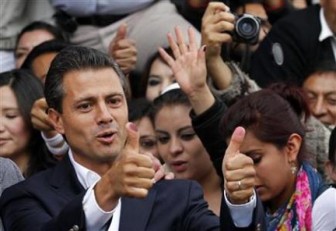MEXICO CITY, (Reuters) – Mexican opposition candidate Enrique Pena Nieto’s campaign team claimed victory in the country’s presidential election yesterday after exit polls showed him winning by a comfortable margin.

Pena Nieto, 45, of the Institutional Revolutionary Party (PRI), led by between 8 and 11 percentage points in exit polls published by three of Mexico’s main television networks after voting ended last night.
Shortly afterward his campaign manager, Luis Videgaray, declared victory.
“It is a resounding triumph,” Videgaray told Milenio television, adding that he was hopeful the PRI would have a majority in the Senate and possibly in the lower house of Congress, too.
The PRI, which governed Mexico for 71 years until losing power in 2000, has staged a comeback behind the handsome Pena Nieto, who has pledged to open state-owned oil monopoly Pemex to foreign investors, raise tax revenue and liberalize the labor market.
The exit polls showed him winning around 40 percent of the vote. Leftist rival Andres Manuel Lopez Obrador was in second place with Josefina Vazquez Mota of the ruling National Action Party, or PAN, trailing in third.
“I recognize that the trend up to this point is not in my favor,” said Vazquez Mota, whose campaign was dragged down by a brutal war with drug cartels and the government’s patchy economic record.
Preliminary official results were due in the next few hours. “It’s time for the PRI to return. They’re the only ones who know how to govern,” said Candelaria Puc, 70, as she voted in the beach resort of Cancun. “The PRI is tough, but they won’t let the drug violence get out of control.”
Others feared a return to the worst years of PRI rule and put Pena Nieto’s big lead down to his cozy relationship with Televisa, Mexico’s top broadcaster.
“It’s the same party as ever and the people who vote for him (Pena Nieto) believe they are going to live happily ever after like in the soap operas,” Humberto Parra, a systems engineer, said as he went to vote in Mexico City.
By the time it lost to the PAN in 2000, the PRI had a reputation for widespread corruption, electoral fraud and authoritarianism.
The PRI was in disarray by 2006, when its presidential candidate came in a distant third, but it has rebounded since then and Pena Nieto gave it a new face.
He is promising to restore security to cities and towns ravaged by the drug war and also plans to reform Pemex, a proposal once considered political suicide.
Mexicans are fiercely protective of Pemex, but the PRI, which nationalized oil production in 1938, could be the one party able to liberalize the energy industry.
The PRI laid the foundations of the modern state with a nimble blend of politics and patronage that allowed it to appeal to labor unions and captains of industry at the same time.
Mexicans eventually tired of heavy-handedness that stifled dissent, rewarded loyalists and allowed widespread corruption.

